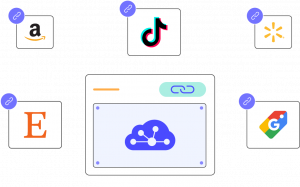When it comes to creating an online store, choosing the right selling platform is crucial. Shopify vs Wix are two popular selling platforms offering various features for creating and managing an online store. While both platforms have their strengths and weaknesses, choosing between the two largely depends on your business needs and goals.
In this article, we’ll take a closer look at Shopify and Wix and help you have a better understanding of which platform is the best fit for your online business.
Expand your Online Sales with LitCommerce
Discover how LitCommerce can seamlessly integrate your Facebook Marketplace with other top platforms. Effortlessly manage listings, orders, and inventory all in one place.
Shopify vs Wix: Which One Meets Your Selling Needs?
I dedicated several days to a comprehensive research approach to deliver a clear and unbiased comparison of Shopify and Wix. I reviewed official websites, analyzed third-party reviews, and created trial accounts on both platforms to evaluate user experience, design flexibility, and eCommerce functionalities.
But before we go into the details, let’s check out a brief comparison of Shopify vs Wix.
Features | Shopify | Wix |
Ease of use | Moderate Separate dashboard and editing systems; real-time preview; wide range of templates. | Easy Drag-and-drop editor and AI-driven setup for quick customization without technical skills. |
Pricing | • Starter ($5/month) • Basic Shopify ($39/month) • Shopify ($105/month) • Advanced Shopify ($399/month) • Shopify plus ( usually around $2,300/month) | • Light: $17/month |
Theme & customizability | 200+ templates and extensive customizability options | 800+ stunning templates available |
POS capabilities | Integrated POS system across most plans; includes Shopify Payments with no extra fees. | Available only on Premium plans; only available to the U.S. and Canada with Wix Payments. |
International focus | Support sells in 20+ languages, Automatically convert prices, accept payments, and receive refunds in their local currency in various currencies. Provides auto tax calculations. | Supports 180 languages and automatically translates your site’s content Each language version can have tailored SEO settings |
Marketing & SEO tools | Offers built-in email marketing tool Has a direct connection to popular social media platforms. Many Shopify SEO apps are available such as SEO King and Smart SEO. | Provides high-quality email marketing services. Strong SEO toolkit integrated, with custom meta tags and URL options. |
ECommerce features | Stands out for an extensive suite of advanced eCommerce tools and features (inventory management, report and analytics, payment methods, shipping, etc) | Support basic eCommerce tools and features (inventory management, report and analytics, payment methods, shipping, etc) |
App integration & add-ons | Over 8,000 apps are available, covering many eCommerce needs, from basic to advanced functions. | 500+ apps focused more on general website features than specialized eCommerce solutions |
Security & support | Advanced security features and 24/7 support (phone & live chat) | Comprehensive security features and 24/7 support (social media, email, phone) |
Wix or Shopify: 9 Key Differences You Should Know?
Now we take a deeper look at the features and functionalities of Shopify vs Wix, helping you make an informed decision.
1. Ease of use – Wix wins
In this ease-of-use comparison, I’ll evaluate two platforms based on their setup process, the intuitiveness of their dashboards, and the ease of managing your store from the backend.
Shopify ease of use
Shopify is a user-friendly platform that simplifies the process of building an online store.
It uses a section-based editor approach, allowing you to tailor each section, such as adding, removing, and rearranging, according to your needs without altering any code. The store setup process is quick, and you are required to answer a few basic questions.
Although it may take longer to perfect the site, Shopify offers a range of pre-made templates that enable users to create an eye-catching and professional storefront easily. Once the storefront is set up, adding products and starting to sell is a simple process.
Wix ease of use
Wix is known for its excellent drag-and-drop editor, allowing merchants to create and customize their storefronts without technical expertise. Once the store is set up, sellers can easily manage and customize the front end by clicking on elements like images, titles, and logos and then dragging them into place.
If you are a beginner with a little experience with a website builder, the drag-and-drop feature in Wix can sometimes lead to a cluttered, disorganized website. That’s why we recommend using Wix ADI instead, as it guides you in creating a clean, visually appealing storefront design.
Verdict: Wix outperforms its competitors when it comes to ease of use. It’s much easier to style your content pages using Wix’s drag-and-drop functionality. The platform’s strength lies in its user-friendly interface, making it easy to build an online store quickly. Although it may lack some of the advanced eCommerce features.
2. Pricing plans – Fair match
A comparison of Shopify vs Wix would only be complete by considering their pricing. Let’s see which one offers better value for money.
Shopify pricing
Shopify pricing provides 5 monthly plans:
- Starter: $5 per month
- Basic: $39 per month
- Shopify: $105 per month
- Advanced: $399 per month
- Shopify Plus: custom pricing based on requirements (with fees usually around $2,300 per month on a 3-year term).
Notes: These pricing tiers only apply to USA e-sellers. Shopify may offer different plans if you are selling in other regions.
Here are some points you can note about the Shopify plan:
- Shopify offers a 3-day trial. After the trial, Shopify offers a $1 monthly payment for 3 months for the Starter and Basic plans.
- Upfront yearly payment for Shopify plans comes with a 25% discount, making the plans $29, $79, and $299 for Basic, Shopify, and Advanced, respectively.
- The Shopify Starter plan allows basic product pages, product embedding, and sales on social media, but it lacks a fully editable standalone online store.
- Shopify Plus is designed for corporates, with pricing negotiable (usually starting at $2,300 per month). It includes features like managing up to 10 stores, advanced security, API access, and dedicated account management.
Wix pricing
There are three Wix pricing plans for eCommerce & businesses:
- Light: $17/month
- Core: $29/month
- Business: $36/month
- Business Elite: $159/month
Here are some points you can note about the Wix plan
- The Core plan costs $36 monthly and provides essential features such as collaborators, 50 GB of storage space, site analytics, and a year of free domain.
- With $7 more, you will be accessible to the Business plan with all the Core plan’s features with two collaborators and storage space plus standard site analytics and eCommerce.
- For businesses requiring even more advanced features, the Business Elite plan is available at $159 per month, including all the features of the Business plan but with advanced tools and unlimited storage space.
Verdict: Wix provides affordable prices compared to Shopify. However, when deciding between Shopify or Wix for small business needs, if you want to build a website that only requires basic eCommerce features, go for Wix. If you need a site with more comprehensive eCommerce features to support your sales strongly, choose Shopify.
In the next section on Shopify vs Wix pricing, we’ll explore how the store design options compare between Shopify vs Wix.
3. Theme & design customization – Shopify wins
In the next section, we’ll explore how the store design options compare between Shopify vs Wix.
Shopify themes
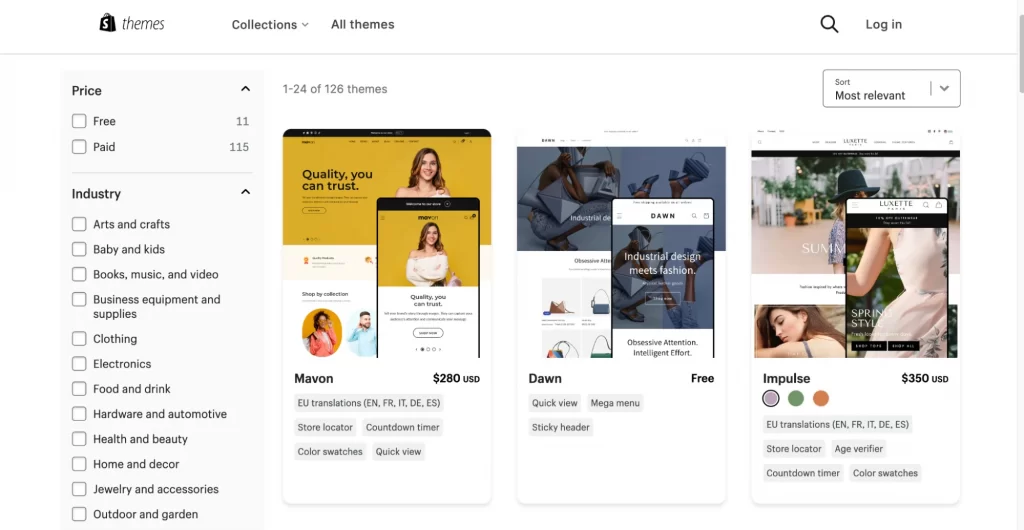
Shopify templates
Shopify offers a wide range of themes for various industries, such as arts and crafts, clothing, electronics, jewelry, automotive, etc. Over 200+ professionally designed themes at the Shopify Theme Store are optimized explicitly for eCommerce businesses. These themes are classified into various categories based on industry, price, and functionality.
Shopify free themes are quite limited in quantity, with just 13 themes per 200+ paid themes. However, they have a quite good layout structure and eye-catching themes for sellers to use. We highly recommend some free themes, including Dawn, Sense, Refresh, and Spotlight.
Besides the free Shopify themes that can help you build unique branding at no cost, the premium options range from $100 to $500 with customizable layouts, typography, and color schemes. They also feature artistic and functional elements, which make them well worth the investment, not to mention their advanced product filtering, zoom, and product reviews.
When considering paid themes, you’ll only need to make a one-time purchase, so just select one that aligns with your budget and specific needs. If you wish to change your theme, Shopify also offers flexibility. Here are a few of our top recommendations: Impulse ($380), Be Yours ($320), and Venue ($360).
Wix templates
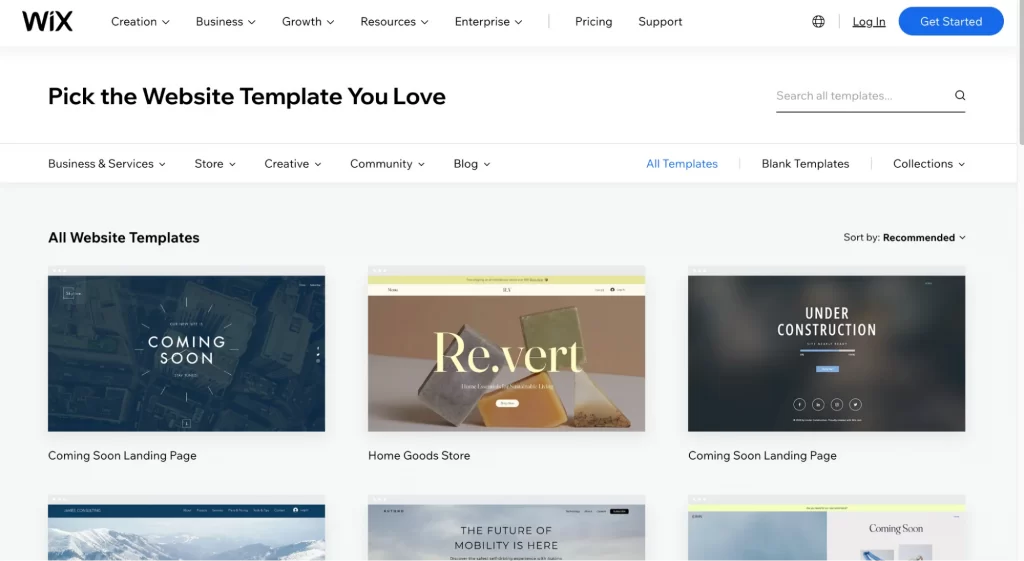
Wix offers an impressive collection of more than 800 free templates for users. While the abundance may make it challenging to choose a suitable option, the platform suggests a list of the best Wix templates for eStores based on specific business requirements and industries such as fashion, jewelry, sports, food, etc.
Every template is designed to cover various aspects and can be easily customed to your heart’s content, thanks to Wix Editor X, Wix ADI, and Editor. Wix also offers Wix Velo – their own coding language that allows users to lift up their storefronts to a higher level.
However, in this Wix vs Shopify comparison round, Wix templates aren’t fully responsive; you may need to adjust elements to ensure they display correctly on smartphones manually. Moreover, changing your site’s theme is impossible, even if you haven’t added any content or elements. So, when you choose a theme, you typically stick with it; it’s important to select one carefully that meets your long-term needs.
Verdict: Regarding themes & design quantity, Wix is the winner. However, there are quite a few limitations if sellers need to be more experienced with website builders. On the other hand, Shopify may have fewer options; its templates are more sophisticated, responsive, and tailored to each industry.
Read more: Ready to launch your online store with Shopify or Wix? Check this comprehensive Shopify tutorial and Wix tutorial now!
4. Point of Sale (POS) capabilities – Shopify wins
In the Shopify vs Wix comparison, if you have a physical store, both platforms offer POS solutions to integrate online and in-store experiences. However, they have key differences.
Shopify POS
Shopify POS allows businesses to manage in-person sales alongside their online operations. It is available on any pricing plan except Shopify Starter and integrates directly with the Shopify eCommerce platform, providing a unified system for inventory management, sales tracking, and customer engagement. Moreover, Shopify offers its own payment gateway (Shopify Payments) with no additional transaction fees.
You can purchase hardware like card readers and receipt printers directly from Shopify if you’re in the US, Canada, UK, or Ireland. Alternatively, you can use your hardware as long as it’s compatible. You can use Shopify POS in any country where Shopify has supported credit card payment providers. Moreover, Shopify offers its payment gateway (Shopify Payments) without additional transaction fees.
Additionally, Shopify supports the Shopify POS app. This powerful app lets you sell products, customize checkout screens, accept payments, track inventory, set up customer profiles, and track purchase history.
Some advantages of using Shopify include inventory management, the availability of multi-store POS systems, major payments, mobile POS hardware, staff management, daily store reports, cash tracking, etc.
Wix POS
Wix offers a comprehensive Point of Sale (POS) system designed to meet the needs of various businesses, particularly in the retail and service sectors. To utilize Wix POS, subscribe to a Wix Premium plan that allows for payment processing. However, Wix POS is currently available to users in the U.S. and Canada and is connected to Wix Payments.
If you’re outside of North America, an alternative solution is available. You can sell via mobile using the Wix Owner app and accept payments through either Square or SumUp. However, this setup may not be ideal for a physical store, as you would be missing out on many essential features.
Additionally, Wix POS is designed to work seamlessly with other Wix products and supports multiple payment methods, such as credit/debit cards, cash, and manual card entry. But, it processes payments through Wix Payments, with a flat fee of 2.6% per transaction in the U.S. and 2.7% in Canada.
Some Wix POS features include sync inventory, automated sales tax, custom screen checkout, POS hardware, secure payment, etc.
Verdict: Shopify surpassed Wix in POS capabilities. It offers more features, extra hardware, and more country availability. Wix POS suits smaller retail or service businesses primarily in the U.S. and Canada. However, it has fewer in-store features and is limited to Wix Payments, making it less versatile for international or hardware-specific needs.
5. International focus – Shopify wins
If you are asking, “Is Wix or Shopify better to sell internationally?” here is one of the criteria that you should consider. There are three aspects, such as language, multicurrency, and tax setting need to be compared between Shopify and Wix.
Shopify
Shopify support sells in up to 20 languages from a single Shopify store, whereas you’ll need to prepare your translation to import into Shopify or install a translation app to translate your Shopify shop content. Shopify provides built-in tools for translation, including the Translate & Adapt app.
Shopify supports multi-currency transactions, allowing merchants to display prices in different currencies based on the customer’s location. When using Shopify Payments, merchants can automatically convert prices, accept payments, and receive refunds in their local currency in various currencies.
Shopify provides auto-tax calculations based on the customer locations. For international sales, merchants have the option to set custom tax rates for different regions or countries.
Wix
Wix supports 180 languages and automatically translates your site’s content for visitors from around the world. The automatic translation feature provides 3,000 free word credits, with options to purchase more if needed, each language version can have tailored SEO settings, allowing merchants to optimize their content for different locales.
Same as Shopify, Wix allows merchants to display prices in different currencies based on the visitor’s location.
About tax setting, Wix offers you two methods of tax collection manual method or automated tax collection with a third party – Avalara. You only need to select the location(s) where you want to collect tax, and Avalara adds the right rate.
Verdict: In this Shopify vs Wix comparison round, Shopify wins. It has the edge for most international sellers due to its integrated tools for multi-language, multi-currency, and automated tax calculations, all of which are built into the platform. However, Wix is a strong contender for those prioritizing broader language options.
6. Marketing & SEO tools – Wix wins
In this round of Shopify vs Wix, both platforms offer excellent automated email marketing campaign tools. However, each platform has unique features and strengths in this area, so let’s dig deeper into each platform!
Shopify marketing tools
- Email marketing: Shopify offers a built-in tool that allows you to promote your products and share updates using a variety of email templates. These templates are customizable, allowing you to add your own personal touch. From your admin panel, you can manage every step of your campaign, including tracking reports to gauge its effectiveness.
- Social media: Shopify has a direct connection to social media platforms like Facebook, Instagram, LinkedIn, Pinterest, etc. Additionally, the themes available on Shopify provide social media linking and sharing options, making it easier to market your store.
- SEO tools: This platform automatically takes care of some aspects, such as adding auto-generated canonical tags to landing pages to prevent duplicate content from appearing in search results.
While there are some limitations to Shopify’s SEO options, such as mandatory strings in specific URLs, there are also many Shopify SEO apps available, such as SEO King, Smart SEO, or SearchPie, to help you improve your website’s search rankings and attract more traffic. However, it also means having a powerful Shopify store with good marketing features, sellers heavily rely on 3rd apps.
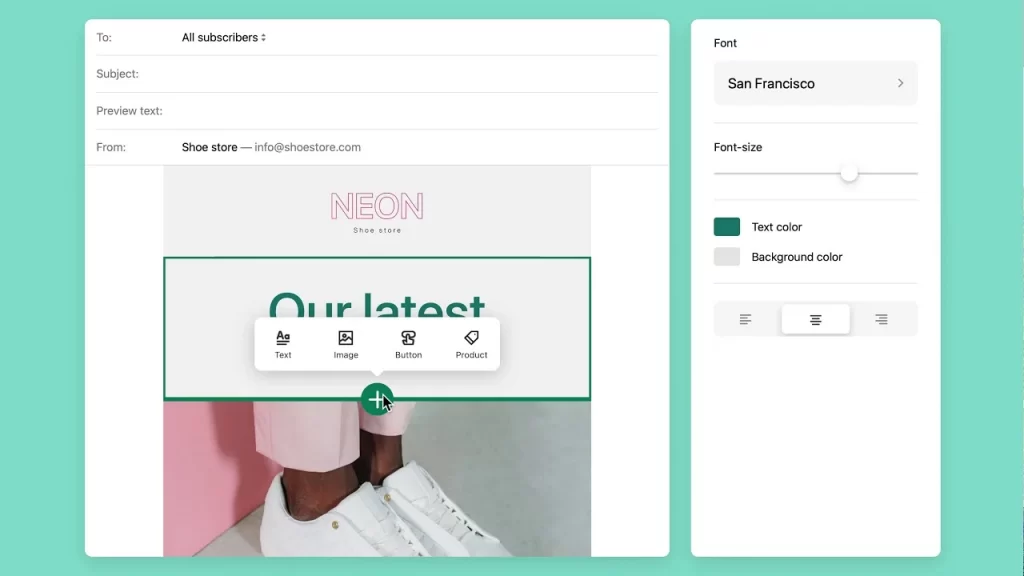
Wix marketing tool
- Email marketing: Meanwhile, Wix offers high-quality email marketing services with a range of customizable email templates to choose from. Additionally, you have the option to create yown templates from scratch to send to your customers.
- SEO tools: Wix comes with a robust SEO toolkit that is integrated into every Wix site, providing merchants with the ability to optimize their SEO workflow effectively. Also, Wix allows merchants to customize meta tags, URL slugs, canonical tags, structured data, and more, allowing you to enhance your site’s visibility and rank higher in search engine results.
Verdict: Shopify outperforms Wix in SEO and marketing capabilities, providing comprehensive SEO tools and advanced marketing features such as abandoned cart recovery and email campaigns. While both tools struggle is URL structure.
7. eCommerce features – Shopify wins
One thing that can’t be missed when making Wix vs Shopify for eCommerce comparison is eCommerce features. In this round, we analyze these main eCommerce features, including inventory management, report and analytics, payment methods, Shipping options, and Mobile app.
Shopify
- Inventory management: This platform provides features that allow you to manage your inventory such as inventory tracking, view your inventory, and adjust your inventory levels on Shopify. Besides, you can also view the history of inventory adjustments for products and variants.
- Report and analytics: Shopify offers many reporting features, such as reviewing your store’s recent activity, getting insight into your visitors, analyzing your web performance, and analyzing your store’s transactions. Upgrading to Advanced Shopify or Shopify Plus provides enhanced analytics with advanced filtering options for in-depth analysis.
- Payment methods: Shopify offers its own payment solution, Shopify Payments. Because of this, merchants won’t be charged transaction fees. You can also access Shopify payment features such as fraud analysis, chargeback protection, etc. However, it isn’t available in all countries.
If you you other payment processors, including Paypal, Stripe, etc, Shopify still charges you an additional transaction fee ( 2.5% to 0.5%, depending on your plan).
- Shipping options: Shopify provides access to discounted shipping rates from major carriers like USPS, UPS, and DHL (save 88% if you are in the US, Canada Post in Canada, and Sendle in Australia.
Additionally, Shopify Shipping provides sellers with features such as overnight delivery, international shipping, and shipping insurance. It also offers accessible tracking, address validation, customized packing slips, and notification emails.
- Mobile app: Shopify provides powerful apps that enable merchants to manage their eCommerce businesses effectively from anywhere. You can manage orders, track inventory, process payments, and customize your online store directly from your smartphones or tablets.
Wix
- Inventory management: Wix just provides a basic inventory management feature. It allows merchants to choose between two primary methods for managing inventory: tracking inventory and manual status updates. Sellers can track how many specific products they have in stock or manually assign products in stock or out-of-stock status.
We can see that Wix lacks some of the built-in inventory management features that Shopify offers.
- Report and analytics: Compared to Shopify, Wix offers more limited built-in analytics features. There are some Wix reports and analytics that can be mentioned are adjust your business reports, such as website traffic, revenue breakdowns, customer shopping behaviors, or conversion rate.
- Payment methods: Wix supports all the traditional payment processors, including PayPal, Stripe, Square, Apple Pay, Google Pay, etc.
- Shipping options: Wix allows merchants to set up specific shipping regions, which can include domestic areas and international locations. With domestic shipments, you can apply standard local shipping rates and carrier integrations. Moreover, you can set up different shipping rules for different regions.
Wix offers a mobile app that allows merchants to manage their shipping settings on the go, making it easier to adjust rules and monitor orders from anywhere.
- Mobile app: The Wix mobile app is designed not only to help users manage their online businesses but also their websites. Some eCommerce features that can be mentioned include managing inventory, uploading images, fulfilling customer orders, adding tracking numbers, etc, or tracking traffic campaigns, drafting, editing, sharing blog posts, etc.
Verdict: Shopify and Wix both support basic eCommerce features, but Shopify stands out for its extensive suite of advanced tools. Wix, while more limited in eCommerce features, is still a solid option for smaller operations, those just starting in eCommerce.
8. App integration and add-ons – Shopify wins
Shopify and Wix have massive marketplaces, with tons of apps from third-party developers and the platforms themselves.
Let’s see, Shopify vs Wix, which selling channel outperforms in terms of apps!
Shopify App Store
You can find almost everything to handle your online store in nearly every need, from retailing and POD to dropshipping. Shopify App Store offers a vast selection of over 8000 apps to help merchants expand and optimize their online stores. It s both free and paid Shopify apps that integrate smoothly with the platform, covering everything from file uploads to custom push notifications, making it easy to find the right tools for online selling.
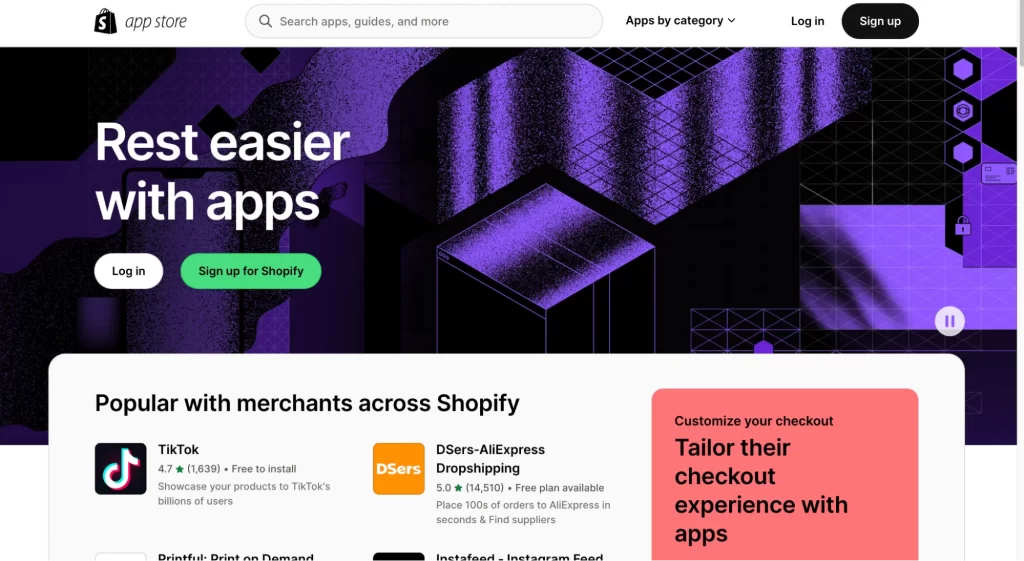
Wix App Market
Wix supports a range of more than 500 apps and add-ons, which are divided into six main categories. These include marketing, selling online, services and events, media and content, design elements, and communication. Compared to Shopify, the number of Wix apps markets is significantly lower.
The Wix app market caters to various needs, such as integrating your site with social media platforms, adding live chat support, creating and managing email campaigns, and much more. However, Wix’s integrated to focus more on general website ferather than specialized eCommerce enhancements.
Verdict
Shopify’s app store outperforms Wix with a wider range of eCommerce integrations available. Wix is not an ideal option when it comes to bigger and better eCommerce features.
9. Security and compliance – Fair match
When making a comparison of Shopify vs Wix. We can’t forget security and compliance factors.
Shopify
Shopify takes security seriously and offers a range of features to keep its merchants’ data and transactions safe. As a hosted platform, Shopify handles updates and security in the background, including running on a Level 1 PCI-compliant server. SSL encryption is also available for every Shopify store, providing an extra layer of protection for visitors’ data.
In addition, Shopify provides SOC (System and Organization Controls) reports and Transparency reports, which are assessments of the company’s information systems by third-party auditors. These reports demonstrate that Shopify meets independent standards related to the security and availability of its services.
Wix
Wix strongly emphasizes website security, offering users peace of mind when it comes to protecting their data and transactions. Every Wix website comes with SSL web security, which ensures that connections are secure and private over an HTTPS connection.
Additionally, the platform runs on Level 1 PCI Compliant and TLS 1.2, which are the highest standards for payment security. Wix also provides DDoS protection and reliable web hosting to ensure that websites are always up and running, even during high-traffic periods.
Verdict: It’s a draw. Both Wix and Shopify offer ample security measures to safeguard your online store, ensuring that you can trust either platform you select.
Is selling on both Shopify and Wix possible?
Yes. With LitCommerce, you can sync Shopify inventory, orders, and pricing with your Wix store in real time.
Shopify vs Wix: Final Conclusion
After comparing Wix ecommerce vs Shopify, it’s essential to determine which platform best supports your business goals. Here are some key conclusions:
Shopify is best suited for the following:
- Medium to large businesses: Shopify robust inventory management, payment processing options, and advanced analytics are designed for online processing options and advanced analytics.
- Businesses that have both online and physical stores: Shopify allows for seamless management of both sales channels thanks to its integrated Point of Sale (POS) capabilities.
- Companies that anticipate scaling their operations: Shopify has a good scalable infrastructure that supports larger inventories, multiple sales channels, and complex shipping needs.
Wix is best suited for the following
- New to website building or eCommerce: Wix’s drag-and-drop interface makes it easy to create visually appealing sites without technical skills.
- Showcase content alongside eCommerce (like blogs, portfolios, or service-based businesses): Wix’s design flexibility and template variety offer great customization options.
- Small businesses or individual entrepreneurs looking for a cost-effective solution: Wix supports basic eCommerce features.
- Retailers focused primarily on local sales and without complex needs for inventory or multi-channel selling.
Shopify vs Wix: FAQs
Shopify vs Wix has its own strengths and weaknesses. Shopify is specifically designed for eCommerce and has a wider range of features tailored to online businesses. It is also more scalable, secure, and has better SEO options than Wix. On the other hand, Wix, a Shopify competitor, is easier to use, has more design options, and is more affordable, making it a better option for small businesses or beginners. Yes, it is possible to switch from Wix to Shopify. However, you will need to migrate your website’s content, products, and other data to Shopify manually or using a migration tool. You may also need to recreate your website’s design on Shopify or choose from its available templates. Shopify and Wix are not compatible with each other, as they are two different platforms with different systems and infrastructures.
Is selling on both Shopify and Wix possible?
|
Shopify vs Wix: Final Words
Ultimately, the choice between Shopify vs Wix depends on the specific needs of your business. You need to analyze Shopify pros and cons, as well as look at both sides of Wix review before making any decision.
If you prioritize eCommerce functionality and are willing to pay a higher monthly fee, Shopify may be the better option. However, if you prioritize design flexibility and a lower cost of entry, Wix may be the way to go.
Regardless of which platform, it is important to evaluate your options and consider your long-term business goals carefully. With the right strategy and tools in place, Shopify or Wix can help you create a successful online presence.
Check out the LitCommerce Retailers Blog and join the LitCommerce community today for valuable insights and resources on eCommerce.


